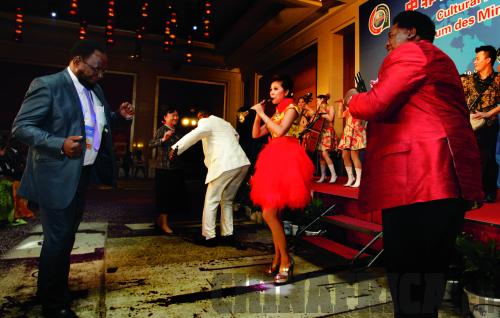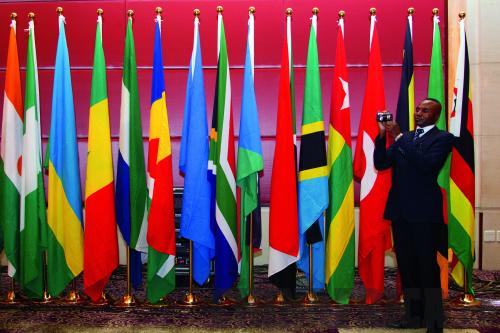|
 |
|
Dance Moves:Chinese and African leaders believe cultural exchange also has positive economic spin-offs (WANG XIANG) |
Pragmatic approach
"Our oil and mineral resources will run out, but culture is eternal. Such forums for cultural exchanges provide an opportunity to bring our hearts together," Liwimbi told the forum.
To better implement resolutions reached at the forum, ministers hoped for more such exchange events and proposed the establishment of a joint commission or a technical working group on China-Africa cultural cooperation. "It will follow up the implementation and evaluate the progress of cultural agreements as well as advise on better cooperation," said Mashatile.
"The most important thing is that such working group is influential and effective," Zhang noted. He suggested that an internal coordination mechanism should be established so that concerted efforts can be achieved.
Protecting cultural heritage and training cultural management staff and professionals were also highlighted in the future Sino-African cultural exchanges. Mali's Minister of Crafts, Culture and Tourism Diallo Fadima Toure appeals to safeguard her country's cultural heritage now being threatened by war. She was echoed by all the attendants. "[Cultural heritages] are not only about historical memories, it is about life. We hope they can be preserved so that they can serve society through tourism and help the young generation learn about their history," she said.
As Sino-African relations develop, the focus of personnel training is shifting from including governmental officials to covering artists, cultural management staff and professionals, according to Yu. He said that the Ministry of Culture was considering a program to help 100 Chinese cultural organizations, like museums, establish cooperation relations with African counterparts to train more cultural professionals.
People involvement
Attendants from both China and Africa reached a consensus that truly cultural prosperity was about ordinary people benefiting from cultural exchanges. "Enjoying cultural achievements is not a privilege exclusive to social elite, but a necessary spiritual demand that should be fulfilled for everyone," Mohamed Amine Sbihi, Minister of Culture of Morocco, said at the forum. He said local governments of Morocco planned to build cultural centers and facilities, like museums, libraries and theaters, to guarantee the general public's access to culture-related events.
"Only when ordinary people become the real participants of cultural events, could they truly understand the significance of cultural exchanges, and in turn could the Sino-African cultural relations be sustainable," Liu Hongwu said in an interview with ChinAfrica.
Zhang agreed with Sbihi and Liu in this regard. "The influences of forums, meetings and theatrical performances are limited as only a few people can attend or see them," he said. He added that with the influence of media and popularity of reading materials, the public would easily learn about foreign culture.
It was also suggested that women and the youth be invited to participate in more cultural communications. "Women and children's rights should be respected in the field of culture," Lazarus Dokora, Deputy Minister of Education, Sport, Arts and Culture of Zimbabwe, said at the forum. "No matter in which country, including African ones, it is the women and the youth that carry the burdens of the cultural frontier, looking after the young and the old, and bringing hope to people with their music and dances," he added.
Mashatile was an advocate for mass participation in cultural events. He planned to hold a musical festival in Beijing next year. "It will be a grand event. I will also join in the dance," he said, calling for people, no matter who they were and where they came from, to come and dance as well as enjoy the unique music from both China and Africa.
 |
|
(WANG XIANG) |
Beijing Statement of FOCAC Cultural Ministers’ Forum is available at:
http://www.chinafrica.cn/english/lifestyle/txt/2012-07/02/content_464137.htm |